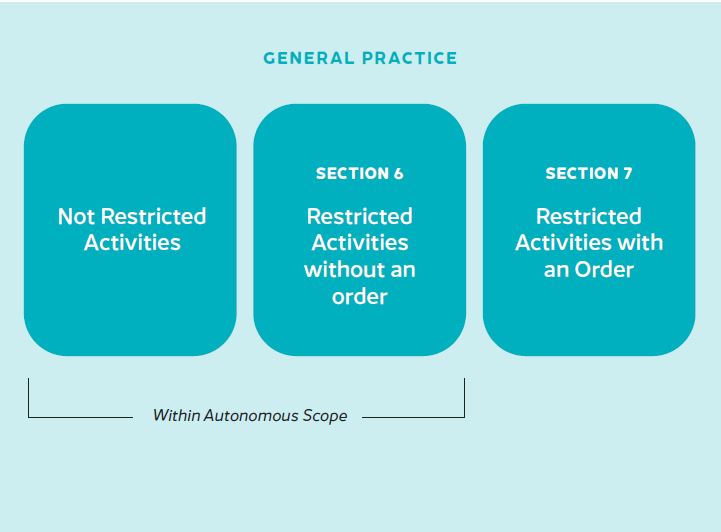Nursing practice includes a wide range of activities that nurses perform independent of other health care professionals. In other words, nurses have the authority to act according to their professional nursing judgment within the limits of the nursing regulations, their scope of practice, organization/employer policies, and their individual competence.
Autonomous scope of practice is a nurse’s ability to make decisions about client care activities (section 6 of the nursing regulations) that they are educated, competent and authorized to make. Autonomous scope of practice includes acting to perform these activities within the BCCNM Scope of Practice Standards, Limits and Conditions, without the direction or authorization by another health care provider.
Nurses assume accountability and responsibility for activities they perform within their autonomous scope of practice. Important: Autonomous scope of practice for all designations
does not include activities listed in section 7 of the applicable regulation.
Acting within autonomous scope of practice refers to nurses:
- making decisions about client care, and
- performing activities that they are educated, competent, and allowed to perform (i.e. restricted activities listed in section 6 of their applicable regulation and non-restricted activities)
Each nursing designation has its own autonomous scope of practice based on the activities listed in their regulation:
- Scope of Practice Overview: RPN
-

Remember, each nurse has their own autonomous scope of practice based on their individual competencies. A nurse’s competence to perform an activity may limit their practice, as a nurse’s practice is limited to the activities they have the competence to perform.
Resources
We have some resources to help you understand the Autonomous Scope of Practice Standard:
-
Hypoglycemia case study
FAQs
- Can a nurse pronounce death?
-
Yes, a nurse can pronounce death. Pronouncing death is determining that life has ceased based on a physical assessment. In B.C. there are no laws governing who can pronounce death; however, BCCNM has limits and conditions on pronouncing death, and your organization/employer may have policies and procedures related to this. Check your Scope of Practice document.
LPNs, RNs, and RPNs do not pronounce death related to Medical Assistance in Dying (MAiD).
NPs can pronounce death related to Medical Assistance in Dying. RPNs have a
condition requiring them to follow a decision support tool when pronouncing unexpected deaths.
- Can a nurse autonomously make a nursing diagnosis and treat a suspected opioid overdose?
-
Yes. Administering naloxone
without an order is an activity that is within a nurse’s autonomous scope of practice if they have the competencies and the activity is not restricted by organization/employer policies. The standard, Acting Within Autonomous Scope of Practice, outlines the requirements for nurses when they carry out an activity within their autonomous scope of practice.
Under the LPN, RN and
RPNnursing regulations nurses are authorized to diagnose and treat
conditions that are within their autonomous scope of practice. The Scope of Practice for LPNs, RNs and RPNs sets the standards, limits and conditions under which nurses can give naloxone to treat opioid overdose.
Also in this section